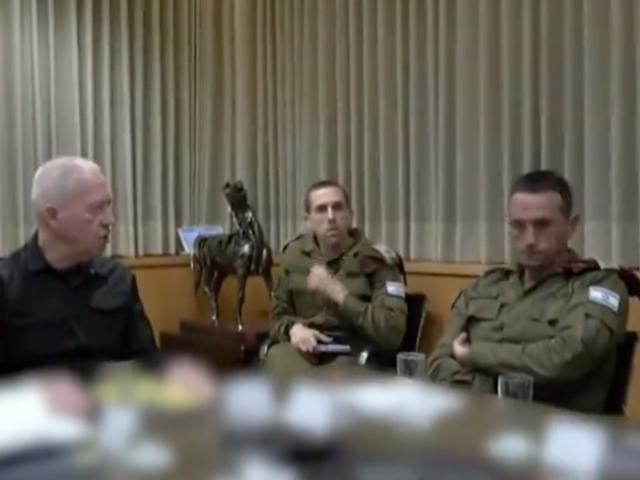In the wake of Iran's ambitious yet ultimately unsuccessful attempt to breach Israel's defenses with a coordinated drone and missile assault, the geopolitical landscape remains tense, highlighting the intricate dance of diplomacy and military strategy. As the dust settles from this audacious attack, Israel's measured contemplation of its next steps could set the stage for either heightened conflict or a tempered standoff.
There is a consensus among most of the world's media that Iran's overnight operation aimed at Israel was a spectacular failure. The Israeli military, in a statement on Sunday, confirmed the interception of hundreds of missiles and drones, achieved with significant assistance from the United States and other allies. This collaborative effort not only underscored the strength of Israel's air defense systems but also demonstrated the depth of strategic ties with key Western nations and regional partners.
🚨🇮🇱🇮🇷ISRAEL’S POTENTIAL RESPONSE TO IRAN'S ATTACK
— Mario Nawfal (@MarioNawfal) April 14, 2024
When the Israeli war cabinet meets in a few hours, Netanyahu will be under pressure to respond aggressively, given that Iran launched the majority of its attack on them directly from its own territory.
Some options they will… https://t.co/RDkcnkwvNa pic.twitter.com/8jJTrZzbDH
The United States, in particular, has reiterated its steadfast commitment to Israel's security through statements affirming "ironclad" support. This assurance was accompanied by notable contributions from Britain and Jordan, whose involvement was pivotal in thwarting the assault. The effectiveness of this multi-national defense collaboration sends a potent signal to Iran and its affiliates regarding the international community's readiness to support Israel. However, given the failure of Iran to penetrate Israel's defenses, the U.S. President Joe Biden has reportedly asked Israel not to launch a counter attack out of fear of escalating a regional war.
Iran's failure to penetrate Israel's well-fortified defense network marks a significant setback, raising questions about the viability of its military tactics and strategic positioning. This event may necessitate a period of introspection within Iran's military echelons as they grapple with the implications of their foiled operation. Despite this, within Iran the mullahs are praising the attack. Either out of delusion or hubris, they are acting as if their drones and missiles hit their targets.
Israeli Foreign Minister Katz: "We said that if Iran attacks Israel, we will respond in Iran. That statement is still valid."
— Aviva Klompas (@AvivaKlompas) April 14, 2024
Despite the successful defense, the possibility of an Israeli retaliatory strike looms large, potentially escalating tensions further. Israeli officials are now faced with a critical decision: whether to pursue a direct military response that could lead to an escalation of hostilities, or to heed international calls for restraint and engage in diplomatic efforts to de-escalate the situation. The war cabinet is meeting this afternoon to discuss a response that would be appropriate, however many within the wider cabinet on the right-wing side will settle for nothing less that an attack on Iranian soil. The rationale is that even if the missiles did not damage anything inside Israel, defending against them cost the Jewish State hundreds of millions of dollars in interceptor missiles and jet fuel. A price must be exacted.
Prominent international voices, including the U.S. President and British Prime Minister Sunak, have advocated for a diplomatic approach, discouraging further military action. This stance reflects a broader consensus among Western nations on the necessity of avoiding a spiral into wider conflict, which could destabilize the already volatile Middle East region.
If Israel doesn’t respond, Iran will make this the new normal. If Israel does respond, the world will accuse it of warmongering. That’s how the other side works pic.twitter.com/QktdwBhrpM
— Jake Wallis Simons (@JakeWSimons) April 14, 2024
However, the involvement of Iranian proxies in these attacks, as noted by the U.S., adds another layer of complexity. Washington has explicitly warned these groups against actions that threaten U.S. forces, thereby highlighting the broader regional implications of Iran's aggressive posture.
The internal dynamics within Israel also play a crucial role in shaping the response. The right-wing factions within the country are vociferous in their calls for a forceful retaliation, arguing that Iran's direct assault on Israeli territory crosses a red line that demands a decisive reaction.
Ynet is reporting that after the Biden Bibi call, and based on the fact that the attack from Iran failed miserably. Israel will not respond right now but at a later date. Instead, they concentrate on covert operations inside Iran, a Huge mistake IMHO
— Raylan Givens (@JewishWarrior13) April 14, 2024
As Israel navigates these troubled waters, the global community watches closely. The outcome of this incident will not only influence Iran's future strategies but also define the regional alliances and the international response to aggression. The stakes are undeniably high, and the path to stability requires careful, calculated decisions that balance the imperative of national security with the overarching need for regional peace.


